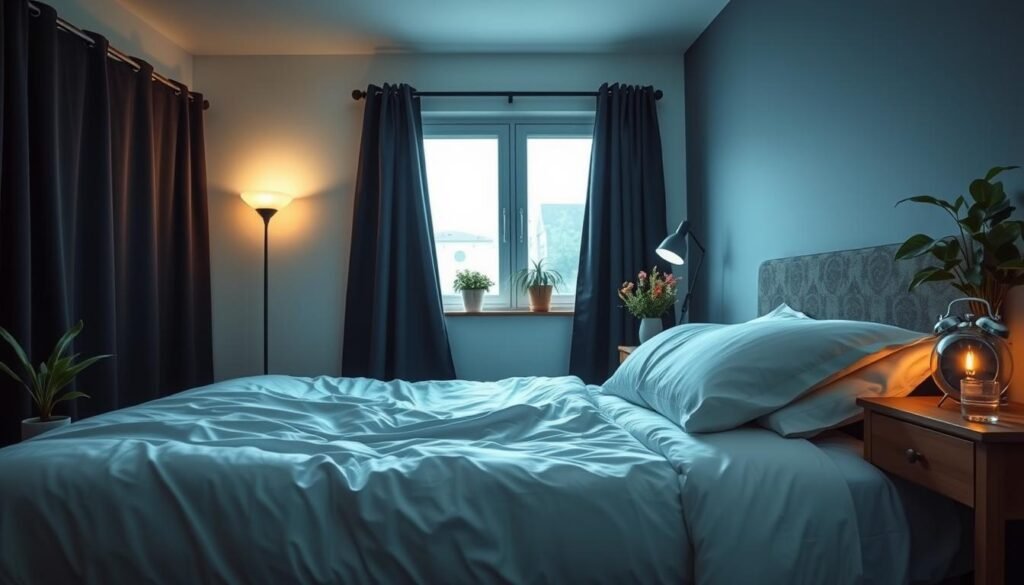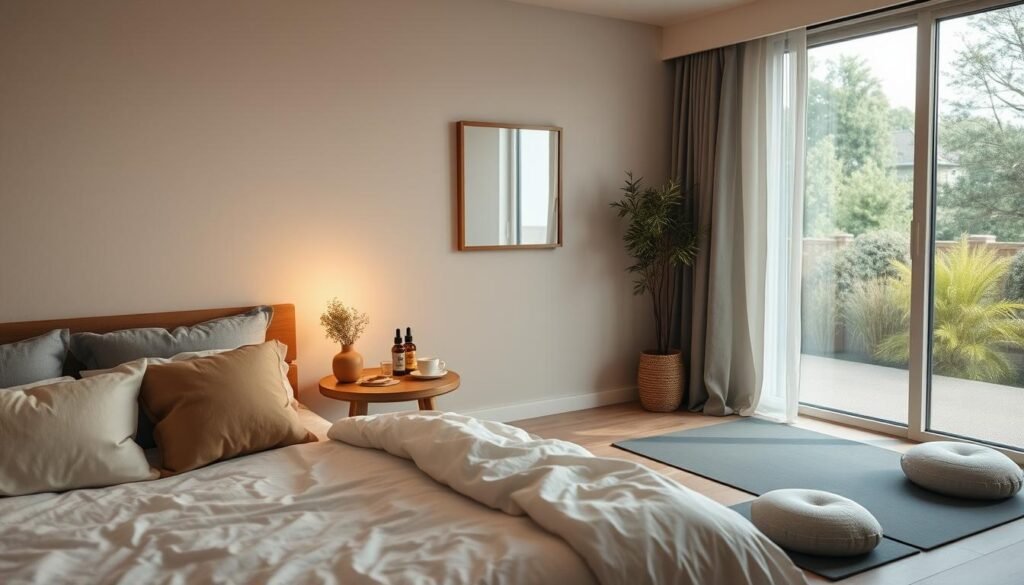Did you know that 10% to 30% of US adults struggle with insomnia? This sleep issue makes it hard to fall asleep, stay asleep, or get up too early. It greatly hurts your health and daily life. Learning how to treat insomnia is key for getting back to good sleep. This article talks about ways to sleep better. You’ll learn about checking for insomnia, good sleep habits, cognitive behavioral therapy, medicines, ways to change your lifestyle, and other treatments. We use advice from places like the Mayo Clinic and the Sleep Foundation. This guide gives you the best sleep advice. It helps people enjoy better sleep again.
Key Takeaways
- Insomnia affects 10% to 30% of adults, highlighting its commonality.
- Cognitive Behavioral Therapy (CBT) is a first-line treatment for insomnia.
- Prescription sleeping pills are not recommended for long-term use.
- Lifestyle changes can significantly improve sleep quality.
- Short-term relief from insomnia can be achieved using sleep medications.
- Alternative therapies, such as melatonin and yoga, may assist in managing insomnia.
- Understanding sleep hygiene is essential for effective treatment strategies.
Understanding Insomnia and Its Prevalence
Insomnia is a common issue in the United States, affecting many adults. It’s important to learn about it by looking at the numbers. These show it’s a big problem for society.
Research says up to two-thirds of people may face insomnia symptoms now and then. Yet, not everyone is officially diagnosed. About 10% to 15% of people suffer from chronic insomnia. This means their sleep troubles last for over three months.
Insomnia Statistics in the United States
Many things can change how common insomnia is. This includes age, gender, and health problems. For instance, insomnia is more common in women, older adults, and those with certain health issues. Anxiety and depression can also make it worse.
Statistics help us understand how insomnia affects lives and society. Studies link it to a worse quality of life. It can hurt your ability to move and think quickly and make you more alert.
Demographics of Chronic Insomnia
Looking at who gets chronic insomnia gives us valuable info. It shows the need for healthcare and support from families and communities. People with sleep problems often face daily challenges.
Studying sleep disorders is key. Thanks to treatments like Cognitive Behavioral Therapy for Insomnia (CBT-I), there is hope. It helps tackle the tough parts of chronic insomnia.
| Demographic Factor | Impact on Insomnia Prevalence |
|---|---|
| Gender | Higher rates in women |
| Age | Increased prevalence in older adults |
| Socioeconomic Status | Lower status linked to higher risk |
| Medical Conditions | Chronic pain and diabetes raise risk |
| Mood Disorders | Anxiety and depression correlate with insomnia |
| Family History | Positive history increases likelihood |
What Percentage of People Have Insomnia?
Many people wonder how common insomnia is. It turns out, about 30% of adults have symptoms of this sleep disorder. When looking at symptoms like daytime problems, the number falls to 10%. The strictest standards say that only 6% of people may actually have insomnia.
General Population Sleep Disorder Rates
Who gets insomnia more often? The answer is women and older adults. For the elderly, other health problems can make insomnia worse. A shocking 75% to 90% of those with insomnia also battle different medical issues.
Mental health plays a big role in sleep disorders too. Around 40% of insomniacs also have mental health challenges, with depression being a major factor. Those struggling with insomnia risk accidents more and often miss work. Plus, they spend over 60% more on healthcare than those without sleep issues.
In short, insomnia affects not just sleep, but also health, work, and living costs. Getting the full picture of insomnia is key for finding better ways to tackle it.
| Population Group | Insomnia Prevalence (%) | Comorbid Conditions (%) |
|---|---|---|
| Adults | 30 | 75-90 |
| Women | Higher than average | Higher risk |
| Elderly | Higher than average | Higher risk due to comorbidities |
| Overall | 10 (with daytime impairment) | 40 (psychiatric conditions) |
The Importance of Diagnosing Insomnia
It’s vital to diagnose insomnia accurately to manage it well. Insomnia affects many people, with 10-30% of adults having it at some point. Knowing the exact symptoms and causes is key to finding the right treatment.
Common Assessment Methods for Insomnia
Doctors start by asking about your sleep problems. They look for issues like trouble getting to sleep, staying asleep, or waking up too early. If these problems happen three times a week for over three months, it’s considered consistent. Without tracking your sleep, it’s hard to understand the daytime effects, like feeling tired or having trouble focusing.
Doctors use different assessment methods to learn about your sleep, such as:
- Physical exams to check for other health problems
- Questionnaires that ask about your sleep habits
- Keeping a sleep diary to note sleep patterns and interruptions
- Overnight studies (polysomnography) for detailed insights
- Actigraphy tests to monitor when you sleep and wake
- Blood tests to look for medical reasons for insomnia
This detailed evaluation helps understand each person’s unique situation with insomnia. It takes into account how your lifestyle, stress, and where you sleep might affect your rest. Using this information leads to better treatment plans, helping lower the impact of insomnia on health care. To learn more about how certain behaviors can lead to insomnia, check out this resource.
One of the First Steps in Treating Insomnia Is to Understand Sleep Hygiene
Getting better sleep starts with good sleep hygiene. Creating a calm sleep space is key. By following specific steps, you can improve your sleep and beat insomnia.
Creating a Restful Sleep Environment
To make your bedroom a sleep oasis, think about a few important things. This includes:
- Making sure the room is dark, quiet, and comfy.
- Using blackout curtains, earplugs, or white noise machines to keep it quiet.
- Choosing a mattress and pillows that feel great to you.
Making these changes helps create the perfect spot for sleeping. It confirms the value of good sleep habits. This also makes a regular sleep routine easier to keep up.
Establishing and Maintaining a Sleep Schedule
Sticking to a consistent sleep schedule is a must. A regular bedtime and wake-up time support your body’s natural sleep-wake cycle. Here are a few tips:
- Try to sleep and get up at the same time every day, even on days off.
- Stay away from big meals, caffeine, and alcohol before bedtime.
- Do calm activities like reading or taking a warm bath before bed.
Keeping track of how you sleep can tell you a lot about what affects your sleep. A sleep diary can help find what changes might improve your sleep hygiene. For more tips, check this resource.

Cognitive Behavioral Therapy for Insomnia (CBT-I)
Cognitive Behavioral Therapy for Insomnia (CBT-I) stands as a top choice to treat sleep disorders without medicine. It usually involves 6 to 8 sessions. These sessions change negative sleep thoughts and actions, leading to better sleep. CBT-I offers personalized strategies, greatly helping with insomnia.
Integrating CBT-I into Treatment Plans
Adding CBT-I to a treatment plan needs a deep look at a person’s sleep habits. Techniques like Sleep Restriction Therapy (SRT) adjust sleep times to fit when they can actually sleep. Stimulus Control Therapy (SCT) helps patients see their bed as a place for sleep and intimacy. This helps build good sleep routines. Cognitive Therapy (CT) changes bad sleep thoughts and lowers worry before bed. Plus, knowing about Sleep Hygiene (SH) is key. It teaches about things and choices that impact sleep, like cutting down on caffeine.
Benefits of CBT-I Compared to Medication
The gains from CBT-I are big and lasting. Research shows CBT-I lowers the time it takes to fall asleep by about 19 minutes. It also improves how well you sleep by up to 10%. CBT-I works as well as sleep medicine but doesn’t have the bad side effects. It helps keep good sleep going over the long term. A study in 2024 found that people who got CBT-I improved their sleep. It shows this method gives a deep understanding of sleep and helps people control their rest better.
| Technique | Description | Key Outcome |
|---|---|---|
| Sleep Restriction Therapy (SRT) | Limits time spent in bed to match desired sleep duration. | Improves sleep quality and efficiency. |
| Stimulus Control Therapy (SCT) | Encourages using the bed only for sleep and intimacy. | Enhances association of the bed with sleep. |
| Cognitive Therapy (CT) | Modifies negative thoughts about sleep. | Reduces anxiety and promotes healthier sleep attitudes. |
| Sleep Hygiene Education | Informs about lifestyle choices affecting sleep quality. | Encourages healthier pre-sleep habits. |
| Relaxation Techniques | Includes exercises like abdominal breathing. | Reduces tension and prepares the body for sleep. |
The use of Cognitive Behavioral Therapy for Insomnia (CBT-I) should be more widespread. The issue is the lack of trained experts. CBT-I’s focus on teaching and working together lets people change how they sleep. It helps them handle the complex issues around treating insomnia.
Common Medications Used for Treating Insomnia
Many people dealing with insomnia use sleep aids. These range from prescriptions to over-the-counter options. It’s key to know the benefits and risks of these medications when seeking better sleep.
Prescription Sleep Aids: Benefits and Risks
Prescription aids like benzodiazepines, zolpidem, and zaleplon can help you sleep better. But, they can lead to dependency and side effects. These meds might not work as well over time. The American Academy of Sleep Medicine’s 2017 guidelines urge caution with their long use. Such medications usually aren’t for the long haul.
It’s wise to know the risks before using them. Combining them with cognitive behavioral therapy can be more effective. This resource on pharmacologic treatments for chronic talks more about it.
Over-the-Counter Sleep Medications
OTC sleep aids like melatonin and diphenhydramine are other options. About 25 percent of those with insomnia try them. Yet, they might cause side effects like confusion or too much sleepiness, especially in older adults. It’s important not to rely on them too much.
Instead of just using medications, try improving your bedtime routine or your sleep space. This can help improve your sleep without always needing meds. Advice on this can be found here for managing chronic insomnia.

| Type | Example Medications | Benefits | Risks |
|---|---|---|---|
| Prescription Sleep Aids | Benzodiazepines, Zolpidem, Zaleplon | Effective for sleep initiation and maintenance | Dependency, side effects, tolerance |
| OTC Sleep Medications | Melatonin, Diphenhydramine | Readily available, less severe dependency | Drowsiness, confusion, not approved for chronic use |
Lifestyle Changes to Improve Sleep Quality
Making lifestyle changes helps a lot in improving sleep. Knowing what impacts sleep lets people manage their rest better. Focusing on exercise and what you eat is key for better sleep habits.
How Physical Activity Influences Sleep
Regular physical activity improves sleep and lowers the risk of not being able to sleep. Working out makes you tired, which helps you fall asleep easier. People who exercise regularly sleep better. It’s good to exercise early in the day for better sleep.
Without enough activity, you might find it hard to sleep.
The Role of Diet in Sleep Hygiene
Eating right is crucial for good sleep. Choosing foods that help you sleep better is important. It’s best to avoid big meals, caffeine, and alcohol before bed. These can stop your body from relaxing and getting ready for sleep. Eating your last meal a few hours before bed helps too. This prevents discomfort that can mess with your sleep.
| Aspect | Impact on Sleep |
|---|---|
| Physical Activity | Promotes relaxation and helps reduce anxiety, leading to better sleep. |
| Caffeine Intake | Stimulating effects can last for hours, leading to difficulties in falling asleep. |
| Alcohol Consumption | May cause disruptions in the sleep cycle, affecting deep sleep phases. |
| Meal Timing | Heavy meals too close to bedtime can prevent comfort and hinder sleep onset. |
| Napping | Long daytime naps can interfere with nighttime sleep; limit naps to one hour. |
Changing your lifestyle is a great way to get better sleep. For more tips, you can check out resources on how daily habits affect sleep. Like this detailed guide.
Alternative Therapies for Insomnia Management
People are looking into different ways to handle insomnia. They are turning to alternative therapies. These methods use natural supplements and relaxation techniques. They aim to help you sleep better without traditional medicine.
Natural Supplements: Melatonin and Valerian
Natural products like melatonin and valerian root can aid with sleep issues. Melatonin is a hormone that helps control when we sleep and wake up. It can make falling asleep easier and improve sleep quality. Valerian root’s effectiveness is still being studied, but some find it helps them sleep longer and better. Always talk to a doctor before starting any supplement to get the right dose and check for interactions.
Mindfulness and Relaxation Techniques
Mindfulness and relaxation strategies are good for beating anxiety and finding peace before bedtime. Being mindful can keep you in the now, easing worries that keep you up. Yoga and similar activities can also make it easier to fall asleep. These methods work well with other treatments, like cognitive-behavioral therapy. They’re part of a big-picture plan to beat insomnia.

| Technique | Description | Potential Benefits |
|---|---|---|
| Melatonin | A natural hormone that regulates sleep-wake cycles. | Helps to fall asleep faster and improves sleep quality. |
| Valerian | A herbal supplement often used for sleep disorders. | May enhance sleep duration and overall sleep quality. |
| Mindfulness | A practice that focuses on being present and aware. | Reduces anxiety and promotes relaxation. |
| Yoga | A physical practice that incorporates stretching and meditation. | Improves relaxation and sleep quality. |
| Breathing Exercises | Techniques to control breathing and promote calm. | Helps reduce stress and contributes to better sleep. |
The Impact of Stress and Anxiety on Sleep Disorders
Stress and anxiety are key in creating and worsening insomnia. Finding the specific stressors helps improve sleep. Being constantly stressed can make it hard to relax and fall asleep at night. Many people find stress affects their sleep badly, harming their daily life.
Identifying Stressors and Their Effects
About 20% of American adults have anxiety disorders, the top mental health issue in the U.S. This high number links closely to sleep problems. Surveys show that 24% to 36% of those with insomnia also have anxiety disorders. Knowing this link is important for better sleep and less stress.
Several anxiety disorders, like generalized anxiety disorder and PTSD, often come with insomnia. Stress messes with brain chemicals, worsening the problem. Treating these anxiety disorders can greatly improve sleep.
Using stress management techniques, including cognitive behavioral therapy (CBT), helps reduce anxiety. CBT not only deals with anxiety but also lessens stress’s impact on sleep. This lets people take back control over their sleep. Trying out these methods is crucial for anyone dealing with stress’s effects on sleep.
Anxiety and sleep problems are closely connected. Dealing with both at the same time is essential. This approach can lead to better sleep and a happier life.
Knowing how to manage stress-related sleep issues is key for good health.
Conclusion
Dealing with insomnia is not easy. It needs a mix of approaches that look at both the mind and body. Many people face this sleep issue. It’s key to find sleep methods that work well for each person. By cleaning up sleep habits, trying out Cognitive Behavioral Therapy for Insomnia (CBT-I), and checking out meds, you can really improve how well you sleep and feel.
Making changes in your daily life matters a lot in handling insomnia. Staying active, eating right, and practicing mindfulness can help you sleep better. Experts, like those at Jacksonville Sleep Center, highlight the need for treatments made just for you. They make sure to use the newest sleep science methods effectively.
Getting better sleep is not just good for the person with insomnia. It’s good for everyone around them too. The effects of not sleeping well can change your relationships, work, and happiness. If sleep problems don’t go away, getting help from a pro is key. The right help can make your sleep and life much better.